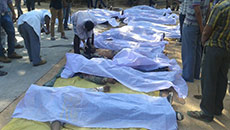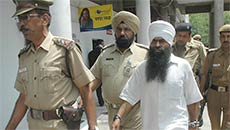The Delhi High Court Thursday upheld death sentences for the four convicts in the Dec 16, 2012 gang rape, holding their "barbaric" act "not worthy of human condonation". The victim's teary-eyed parents said they are "happy" but will feel justice is done after the four are hanged, while a defence lawyer termed the verdict "political".
Delivering the judgment in a jam-packed courtroom, a division bench of Justice Reva Khetrapal and Justice Pratibha Rani said the "completely revolting, gruesome and spine-chilling act" of these convicts leave no chance for their "reformation".
After the verdict, the victim's parents, expressing happiness, said: "We will get justice when we will see them hanging".
Holding each other's hand while coming out of the court room, they told media: "The horrific act done by them deserves nothing less than death and we have got full faith in the judiciary".
About the juvenile, who was sent to the correction home for three years - the maximum sentence possible, they said: "We have challenged this decision in the Supreme Court and it is pending there. We are hopeful of getting justice from there too." The sixth accused had committed suicide in jail.
However, an advocate appearing for convicts told the court that "capital punishment is against human rights" and "its a political stunt" as the "trial court verdict came just before the Delhi assembly elections and now the high court verdict has come just before the Lok Sabha election".
The bench also dismissed the appeals of the four convicts - Mukesh, 26; Akshay Thakur, 28; Pawan Gupta, 19; and Vinay Sharma, 20 - challenging the Sep 13, 2013 trial court verdict and sentence.
The court said the barbarity with which the victim's internal organs were "pulled out with bare hands coupled with the twisting of iron rods through every orifice in her body exhibits outlandish mental perversion not worthy of human condonation".
"To expect society to be a sanguine spectator to this kind of depraved behaviour of the outlandish variety and to continue to extend its protective arm to the convicts would be both unnatural and ludicrous," it said in its 340-page verdict.

The 23-year-old physiotherapy intern was gang-raped and brutally sexually assaulted by six men, including the juvenile, in a moving bus. The accused then threw her and her male companion out of the vehicle, stripped of clothing, to die by the roadside on the cold December night.
The woman died of grave intestinal injuries Dec 29, 2012 at Singapore's Mount Elizabeth Hospital, where she was airlifted for specialised treatment.
The bench said that unparalleled pain was also inflicted upon the victim's family members and her companion, who were "compelled to watch her die many deaths before being certified dead".
What made it worse was that "debauchery, avarice, profligacy and viciousness appear to be the only impelling forces" in the crime, it said, noting it was not committed to alleviate poverty or hunger, nor were the convicts in deprived circumstances.
"Undoubtedly they did not belong to the cream of the society, but they were neither beggars nor vagabonds nor even ruffians for whom crime is a means of self-preservation and is in fact reflective of the social injustice meted out to them," said Justice Khetrapal.
The convicts were "usefully and gainfully employed and were not expected to stoop so low in their lust for money and in order to satiate their egregious sexual appetite".
Justice Pratibha Rani said the victims had reposed complete confidence in the occupants of the contract bus while boarding it to reach their destination but this was "misused".
The court also said that the shocking incident left an "indelible scar on the social order" and became a burning societal issue which crossed national borders.
It said that the case without doubt falls in the "rarest of rare cases" category and where depravity and extreme brutality shock the collective conscience of the society, death sentence has been held to be warranted, it said.

Youth and socio-economic status is not a determinative factor against death sentence in a case of gang rape coupled with murder, it held.
"We conclude by stating the obvious that a strong message needs to be sent to the perpetrators of grotesque and ghastly crimes against women that such crimes shall not be countenanced, though we confess that we are not aware of any case in which a crime of such dimensions has been committed hitherto before".
Stressing the rising trend towards such crime has to be nipped in the bud, it said: "Exemplary punishment is, therefore, the need of the hour, for if this is not the rarest of rare cases, there is likely to be none."





